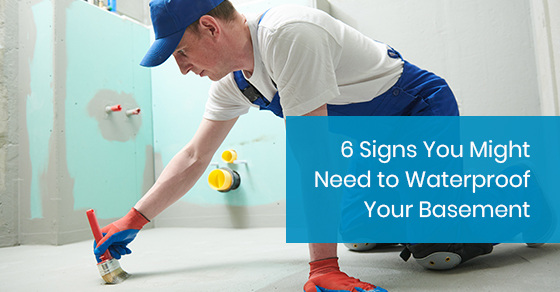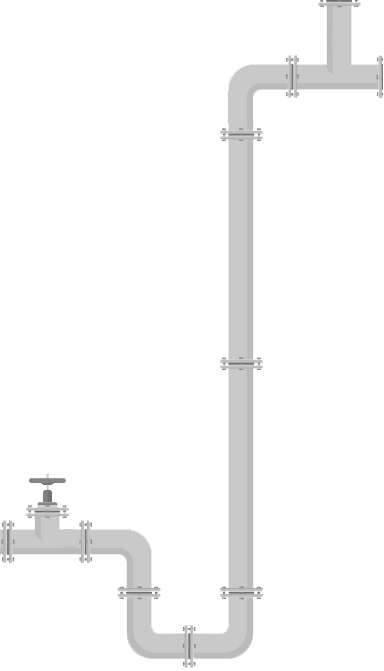6 Signs You Might Need to Waterproof Your Basement
Posted by Jason Genah on 10-11-2020

Water damage is among the main causes of structural damage and one of the leading causes of home insurance claims. Many homeowners assume that they will waterproof their house when there’s an obvious need for repairs, such as the basement flooding. Unfortunately, flooding is usually the last sign of a severely damaged basement, and recovering from this situation will be very difficult and expensive. At this point, you will also have to clean up the basement before waterproofing it, in addition to replacing or repairing any damaged property.
Knowing how to spot the early signs of a foundation that needs waterproofing can save you a lot of time and money on cleaning your flooded basement and recovering water damaged assets. It will also give you ample time to hire house waterproofing experts and protect your property from moisture damage at your own convenience and within your budget.
Here are 6 signs that you may need to waterproof your house:
1. Shimmers on the wall
If your basement wall appears to be sparkly, this may be due to efflorescence forming on its surface. This occurs when your foundation wall has hairline cracks that cause minerals from the wall to be absorbed and deposited on its surface. If you notice these mineral deposits, it is a clear indicator to schedule a foundation waterproofing.
2. Musty odour and damp air
Many signs of water damage tend to be subtle. So, even if there are no pools of water in your basement, you can still tell that all is not well from the smell. If you detect a musty odour, it means that moisture has been lingering for quite a while. The air in the basement may also feel damper. The smell may be associated with a leak, poor ventilation, or other issues. However, basement waterproofing should solve the problem.
3. Mould
In many cases, a musty odour is usually associated with a mould infestation, which may have been caused by water seeping into your basement. Suppose you only get rid of the mould without solving the dampness issue. In that case, the infestation will keep reoccurring and cause allergic reactions to your household, such as a stuffy or runny nose, watery eyes, persistent sneezing or coughing, or an itchy throat and nose. As such, you should contact a waterproofing company as soon as you spot signs of mould in your basement. The professionals will inspect the area to detect the cause of the water seepage and make the necessary repairs.
4. Watermarks
There should be no water stains on the basement walls or floors unless the marks are caused by a specific leak or spill that you’re aware of. Old or faint watermarks are a common indicator of water seeping through the foundation at least once before, which is a situation that may repeat itself in the future and cause other issues.
5. Bowed walls
Your basement walls are exposed to exterior forces from the soil surrounding them as it expands and contracts, depending on its moisture content. Soils that retain more moisture, such as clay, get more saturated easily, resulting in significant swelling, followed by shrinking when it dries. The lateral pressure that clay soil applies to your exterior foundation walls can cause them to shift and crack. So, if you notice that your wall alignment appears uneven or that cracks are forming on the floor, then consider hiring waterproofing experts to manage the problem before it compromises the structural integrity of your house.
6. Radon gas in the air
Radon is a naturally occurring colourless and odourless gas produced from the breakdown of uranium in rocks, soil, and groundwater. Radon gas is one of the leading causes of lung cancer, yet it is impossible to detect it without air quality testing. So it’s important to perform routine indoor air quality tests to ensure that your loved ones are not exposed to this toxic gas. If there are high levels of radon gas in your home, then consider waterproofing your basement. Exposure to radon gas may also cause shortness of breath, hoarseness, wheezing, persistent cough, chest pain, and other pneumonia-like symptoms. Thus, if your household is affected, you should perform the necessary tests and take appropriate action.
When to Waterproof Your Basement
The best time to waterproof your basement is during new construction. However, basements are prone to wetness and may require different waterproofing methods depending on the problem’s root cause. It’s important that you contact a professional waterproofing company to help you identify the cause of your basement’s wetness and use the ideal method to correct the problem and prevent future recurrence. Some of the common causes include:
- Incorrect slope. The ground around your foundation should slope away from the house, so water flows away through gravity. However, if a section of the slope leads towards your basement, then there is the risk of water accumulating around the foundation and even seeping into the basement.
- Insufficient drainage systems. If your house is built on an improper slope, contractors can install drainage systems to help navigate groundwater and rain away from your foundation. If the drainage system is ineffective, it can still allow moisture and water into your basement.
- Condensation. This is a common occurrence in basements with an ineffective waterproofing system, which often leads to dampness, mould, mildew, and ultimately weakens your house’s structure.
- Cracks. If your house is not properly protected against the elements, the constant expansion and contraction with the changing weather can result in fractures forming in the walls, floors, and around your doors and windows that allow water to enter your basement.
- Poorly installed and maintained gutters. Properly installed and maintained gutters are important for draining rainwater away from your home’s foundation. However, when the gutters are poorly installed or excessively clogged, rainwater will fall and settle on your foundation, increasing the likelihood of penetrating your basement.
All of these situations may create hydrostatic pressure as water collects around your home’s foundation instead of flowing away from it through gravity, resulting in cracks in your basement floors and walls. Professional waterproofing companies can help you solve any basement waterproofing problems and reduce the risk of them occurring again.
Final Note
Any moisture or dampness in your basement walls or floors can translate to costly and time-consuming repairs, especially if not corrected in time, resulting in ruined flooring and furniture, health issues due to toxic mould, or structural damage. So, if you’ve noticed water or moisture in your basement, you should take proactive measures for waterproofing your house by contacting the relevant experts.
For more information on waterproofing your basement and other flood protection measures, contact Drain King Plumbers.




